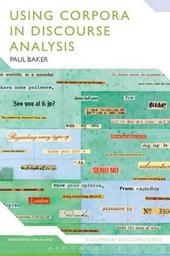
|
Using Corpora in Discourse Analysis
Paperback / softback
Main Details
| Title |
Using Corpora in Discourse Analysis
|
| Authors and Contributors |
By (author) Paul Baker
|
| Series | Continuum Discourse |
|---|
| Physical Properties |
| Format:Paperback / softback | | Pages:208 | | Dimensions(mm): Height 234,Width 156 |
|
| Category/Genre | Semantics |
|---|
| ISBN/Barcode |
9780826477255
|
| Classifications | Dewey:401.41 |
|---|
| Audience | |
|---|
|
Publishing Details |
| Publisher |
Bloomsbury Publishing PLC
|
| Imprint |
Continuum International Publishing Group Ltd.
|
| Publication Date |
23 April 2006 |
| Publication Country |
United Kingdom
|
Description
This book examines approaches to carrying out discourse analysis (DA) using techniques that are grounded in corpus linguistics. Assuming no prior knowledge of corpora, the book examines and evaluates a variety of corpus-based methodologies including: * collocations, * keyness * concordances * dispersion plots * building and annotating corpora Illustrated with a number of real-life examples of corpus-based DA from a range of sources and covering a variety of subjects, this is an informative introduction to using corpus linguistics as a methodology in discourse analysis.
Author Biography
Paul Baker is Professor of English Language at Lancaster University, UK.
ReviewsBaker (Lancaster University, UK) looks at how corpora (computerized collections of naturally occurring language samples) can be used for discourse analysis. The book has four particular strengths. First, the author explains corpus methodologies thoroughly, including frequency and dispersion, concordances, collocates, and keyness. Second, the grounds his explanations in concrete analyses of discourse used in tourism brochures, fox-hunting debates, and news articles on refugees (among other texts), thereby offering exemplars of the methodology; included are several tabular examples of analysis. And fourth, he explores the strengths and limitations of corpus analysis, explaining the need for self-reflection with respect to methodological decision-making. An excellent guide to the scope and method of corpus linguistics as applied to discourse analysis, this book on research methods will be valuable to those in linguistics, rhetoric and communication, literary theory and other humanities fields. -- Choice Reviews Is a necessity for any researcher, practitioner or student interested in the interplay of content, discourse and corpus linguistics. It is a practical, hands-on guide that articulately explores the complex workings of corpora building and analysis. It is a valuable contribution for both the novice exploring the field and the more experienced scholar aiming to refresh their understanding of this ever-growing, ever-evolving discipline. -- Discourse Studies 'Corpus methodologies have a huge potential for use in discourse studies, and Paul Baker has written a superb introduction that combines common sense and academic expertise. As a practical 'how-to' advisor he provides an accessible explanation of the key technical and interpretative issues. As an advocate of innovation, he is sensitive to the priorities and the research paradigms of both the discourse analyst and the corpus linguist. This is a splendid book that will inspire a new generation of research.' Professor Susan Hunston, Department of English, University of Birmingham. * Blurb from reviewer * 'We are given examples of research which demonstrate the various techniques and these can be intriguing...Using Corpora in Discourse Analysis should indeed build bridges, for those who are not already using them, but it will also be useful to anyone interested in language as it is used in texts...the generative nature of the techniques should be stimulating for all those who monitor language use...' -- Alison Duguid * Times Literary Supplement * If you want to know what corpus linguistics can offer to sociolinguists interested in the relationship between language and gender, this book is the answer. I found it hard to put down. Written in a wonderfully accessible style, it provides detailed examples of the challenging questions, messy data, and satisfying, though often approximate, answers that corpus linguistics can provide. It confronts researchers with the real nitty-gritty of the challenges and rewards of each step of a corpus linguistics project. Researchers and students will both find it invaluable. -- Janet Holmes, Professor of Linguistics, Victoria University of Wellington, New Zealand
|